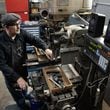It’s an understatement to say that Winston Boteler had an adventurous spirit. He spent his childhood in rural Georgia searching for snakes and arrowheads. At 16 and fresh out of high school, he hopped a train to New York without a penny in his pocket and dug ditches and walked dogs to pay for college. He was an inventor and leader in the field of electro-mechanics at Georgia Tech and worked with the military on innovative pilot and astronaut training simulators and sonar minesweeping technology. He ran in races until age 90 and was a world traveler well into his 90s.
“My dad was always up for any adventure, and he was very robust late in his life and able to do a lot of things,” said daughter Diane Boteler, a physician in Orcas Island, Washington. “He was still running the Peachtree Road Race at 90. He was traveling the world at 95. At age 80 when I asked him what he wanted for his birthday, he said he wanted to climb Mt. Kinabalu. I didn’t even know where it was, and I certainly didn’t know it was the highest mountain in Borneo at 13,500 feet. It was a very difficult climb, but we did it.
“When I was growing up, he was just my father, and I didn’t realize what an amazing person he was,” she added. “He had always been a voracious reader, and he was so smart and knew so much about so many things. It wasn’t until I was an adult that I really started to appreciate how brilliant he was and how much he had accomplished.”
Winston Currie Boteler, 95, of Decatur, a professor emeritus at Georgia Tech, died on Thanksgiving Day, Nov. 24. He was born Jan. 20, 1921, in Washington, D.C. to Jeannette Froneberger and John Wesley Boteler. He was raised in Cedartown, Ga. by his maternal grandmother, Emma Whitesides Froneberger.
Boteler graduated from Cedartown High School in 1937 at age 16 and set out for New York. Ditch digging and walking dogs paid the bills while he studied at City College of New York and rose to the rank of sergeant in the ROTC. He tried to enlist to serve in World War II but was classified 4-F because of his poor eyesight. He decided to train as a war service mechanic at Casey Jones School of Aeronautics in New Jersey and rebuilt thousands of military airplane engines during the war in Rome, N.Y. and Honolulu. After the war, he returned home and started college at Jacksonville State University before transferring to Georgia Tech in 1948. He earned a bachelor’s degree in mechanical engineering in 1952 and stayed on at the Georgia Tech Engineering Experiment Station (now GTRI).
He later earned a master’s degree in mechanical engineering and worked his way up to director of Georgia Tech’s electromechanical division. His signature inventions during that time were vestibular stimulators, built for the military for use in pilot and astronaut training and, for the Navy, remotely operated underwater vehicles with side looking sonar for mine sweeping. The Navy named him an “Honorary Minesweeper Man.”
In 1964, Boteler accepted a post with the United States Agency for International Development to set up an engineering School at Kabul University and moved with his family to Afghanistan. After two years, he returned to the textile engineering department at Georgia Tech where he taught, consulted and continued to invent until his retirement in 1985.
“I was only four years old and too young to remember very much about our time in Afghanistan and our travels there, but I’ve heard about the hair-raising drives over the Khyber Pass into Peshawar (Pakistan)and Delhi (India), a crazy high mountain road with no guardrails,” Diane Boteler said. “Those were the kinds of adventures we had and that were pretty normal in our family.”
Boteler later launched an engineering consulting business that took him around the world. He ran in Atlanta’s Peachtree Road Race until age 90. For the last 20 years of his life, he lived half the year in Thailand, returning from his last trip there about six months before his death.
In addition to his daughter, Boteler is survived by a son, Kevin Boteler of Washington, D.C.; three grandchildren; and nieces and nephews. A celebration of life service is scheduled for 1 p.m. Jan. 21, 2017, in the Gordy Room at Georgia Tech’s Wardlaw Center. The family plans to establish a Georgia Tech scholarship in Boteler’s name. In lieu of flowers, donations may be sent “In memory of Winston C Boteler” payable to the Georgia Tech Foundation Inc.
About the Author






